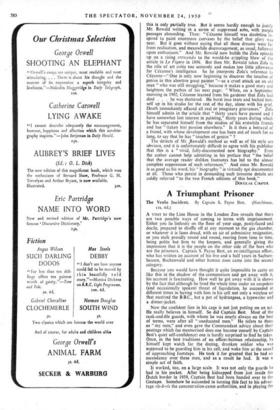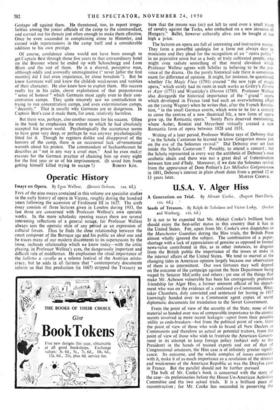A Triumphant Prisoner
The Venlo Incident. By Captain S. Payne Best. (Hutchinson.
12s. 6d.)
A visa- to the Lion House in the London Zoo reveals that there are two possible ways of coming to terms with imprisonment. Either you lie listlessly on the floor of your cage, pasty-faced and docile, prepared to shuffle off at any moment to the gas chamber, or whatever it is lions dread, with an air of submissive resignation, or you stalk proudly round and round, roaring from time to time, being polite but firm to the keepers, and generally giving the impression that it is the people on the other side of the bars who are the prisoners. Captain S. Payne Best, an ex-intelligence officer, who has written an account of his five and a half years in Sachsen- hausen, Buchenwald and other human zoos came into the second category.
Because you would have thought it quite impossible to carry on like this in the shadow of the crematorium and get away with it, his account is fascinating. How well he got away with it is shown by the fact that although he lived the whole time under an unspoken (and occasionally spoken) threat of liquidation, he succeeded at different times in having with him in his cell not only a wireless set that received the B.B.C., but a pot of hydrangeas, a typewriter and a dinner-jacket.
Now the confident lion in his cage is not just putting on an act. He really believes in himself. So did Captain Best. Most of the rank-and-file guards, with whom he was nearly always on the best of terms, were after all " uneducated men." He refers to them as "my men," and even gave the Commandant advice about their postings which (so mesmerised does one become oneself by Captain Best's quiet self-confidence) one is hardly surprised to find he takes. Once, in the best traditions of an officer-batman relationship, h3 himself kept watch for the dozing, drunken soldier who was supposed to be guarding him in his cell, and woke him at the sound of approaching footsteps. He took it for granted that he had an ascendancy over these men, and as a result he had. It was a simple act of faith.
It worked, too, on a large scale. It was not only the guards h3 had in his pocket. After being kidnapped from just inside the Dutch border In 1939, Captain Best had been handed over to the Gestapo. Somehow he succeeded in turning this fact to his advan- tage vis-à-vis the concentration-camp authorities, and in playing the Gestapo off against them. He threatened, too, to report irregu- larities among the junior officials of the camp to the commandant, and carried out his threats just often enough to make them effective. Once he even succeeded in complaining alone to Himmler, and caused wide repercussions in the camp itself and a considerable addition to his own prestige.
Of course, confidence alone would not have been enough to get Captain Best through those five years to that extraordinary hotel on the Brenner where he ended up with Schuschnigg and Leon Blum and the rest of them. He is a shrewd, perceptive man, although oddly and avowedly unimaginative (" never [after the first months] did I feel even impatience, let alone boredom "). But he knew Germans well and knew the childish weaknesses and vanities of their character. He also knew how to exploit them. His success really lay in his calm, clever exploitation of that preposterous "sense of honour" which Germans must apply even to their con- centration camps. They quite sincerely saw no contradiction in trying to run concentration camps, and even extermination camps, "decently." That is usually why Germans are so dangerous. In Captain Best's case it made them, for once, relatively harmless.
But there was, perhaps, also another reason for his success. Often in the book he emphasises the extent to which he had absolutely accepted his prison world. Psychologically the acceptance seems to have gone very deep, or perhaps he was anyway psychologically fitted for it. Though he registers dislike and disapproval of the horrors of the camp, there is an occasional lack ofeemotional warmth about his protest. The commandant of Sachsenhausen he describes as "not in any way a cruel man." And he even makec excuses for the German practice of chaining him up every night for the first year or so of his imprisonment. (It saved him from getting himself killed trying to escape !) ROBERT KEE.















































































 Previous page
Previous page